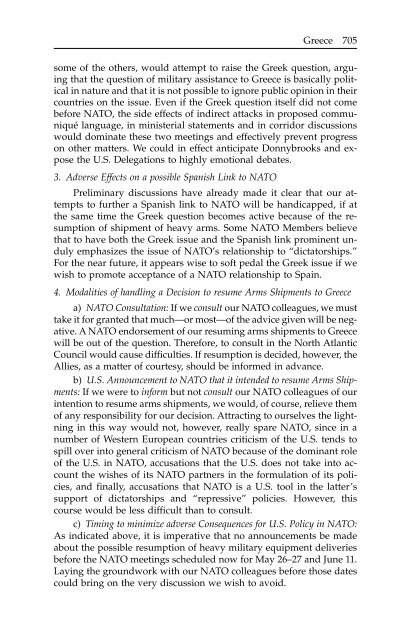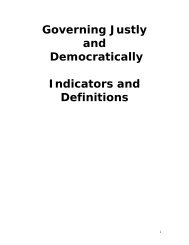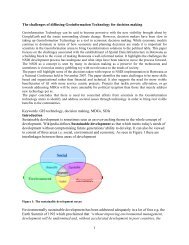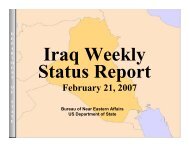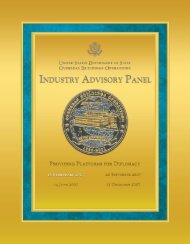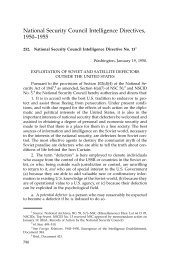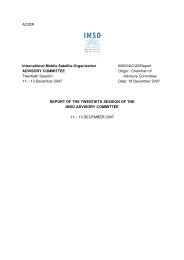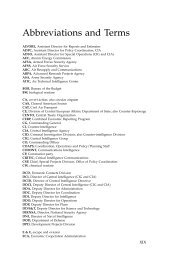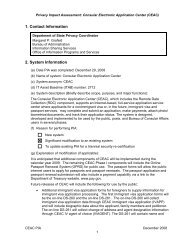Greece - US Department of State
Greece - US Department of State
Greece - US Department of State
You also want an ePaper? Increase the reach of your titles
YUMPU automatically turns print PDFs into web optimized ePapers that Google loves.
<strong>Greece</strong> 705<br />
some <strong>of</strong> the others, would attempt to raise the Greek question, arguing<br />
that the question <strong>of</strong> military assistance to <strong>Greece</strong> is basically political<br />
in nature and that it is not possible to ignore public opinion in their<br />
countries on the issue. Even if the Greek question itself did not come<br />
before NATO, the side effects <strong>of</strong> indirect attacks in proposed communiqué<br />
language, in ministerial statements and in corridor discussions<br />
would dominate these two meetings and effectively prevent progress<br />
on other matters. We could in effect anticipate Donnybrooks and expose<br />
the U.S. Delegations to highly emotional debates.<br />
3. Adverse Effects on a possible Spanish Link to NATO<br />
Preliminary discussions have already made it clear that our attempts<br />
to further a Spanish link to NATO will be handicapped, if at<br />
the same time the Greek question becomes active because <strong>of</strong> the resumption<br />
<strong>of</strong> shipment <strong>of</strong> heavy arms. Some NATO Members believe<br />
that to have both the Greek issue and the Spanish link prominent unduly<br />
emphasizes the issue <strong>of</strong> NATO’s relationship to “dictatorships.”<br />
For the near future, it appears wise to s<strong>of</strong>t pedal the Greek issue if we<br />
wish to promote acceptance <strong>of</strong> a NATO relationship to Spain.<br />
4. Modalities <strong>of</strong> handling a Decision to resume Arms Shipments to <strong>Greece</strong><br />
a) NATO Consultation: If we consult our NATO colleagues, we must<br />
take it for granted that much—or most—<strong>of</strong> the advice given will be negative.<br />
A NATO endorsement <strong>of</strong> our resuming arms shipments to <strong>Greece</strong><br />
will be out <strong>of</strong> the question. Therefore, to consult in the North Atlantic<br />
Council would cause difficulties. If resumption is decided, however, the<br />
Allies, as a matter <strong>of</strong> courtesy, should be informed in advance.<br />
b) U.S. Announcement to NATO that it intended to resume Arms Shipments:<br />
If we were to inform but not consult our NATO colleagues <strong>of</strong> our<br />
intention to resume arms shipments, we would, <strong>of</strong> course, relieve them<br />
<strong>of</strong> any responsibility for our decision. Attracting to ourselves the lightning<br />
in this way would not, however, really spare NATO, since in a<br />
number <strong>of</strong> Western European countries criticism <strong>of</strong> the U.S. tends to<br />
spill over into general criticism <strong>of</strong> NATO because <strong>of</strong> the dominant role<br />
<strong>of</strong> the U.S. in NATO, accusations that the U.S. does not take into account<br />
the wishes <strong>of</strong> its NATO partners in the formulation <strong>of</strong> its policies,<br />
and finally, accusations that NATO is a U.S. tool in the latter’s<br />
support <strong>of</strong> dictatorships and “repressive” policies. However, this<br />
course would be less difficult than to consult.<br />
c) Timing to minimize adverse Consequences for U.S. Policy in NATO:<br />
As indicated above, it is imperative that no announcements be made<br />
about the possible resumption <strong>of</strong> heavy military equipment deliveries<br />
before the NATO meetings scheduled now for May 26–27 and June 11.<br />
Laying the groundwork with our NATO colleagues before those dates<br />
could bring on the very discussion we wish to avoid.


